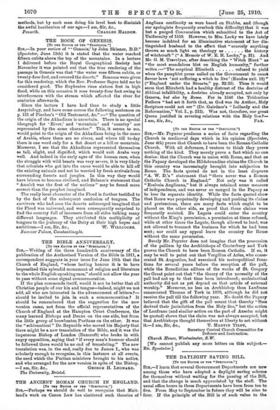THE BOOK OF GENESIS.
[TO THL EDITOR OP THE "SPECTATOR."] SIR,—In your review of "' Genesis,' by John Skinner, D.D." (Spectator, June 11th) it is stated that the water reached fifteen cubits above the top of the mountains. In a lecture I delivered before the Royal Geographical Society last November it was pointed out that the true rendering of the passage in Genesis was that "the water rose fifteen cubits, or twenty-four feet, and covered the deserts." Reasons were given for this rendering, which the Rev. Professor Sayce told me he considered good. The Euphrates rises sixteen feet in high flood, while on this occasion it rose twenty-four feet owing to interferences with the stream which affected the river for centuries afterwards.
Since the lecture I have had time to study a little Assyriology, and have come across the following sentences on p. 121 of Pinches's " Old Testament, Esc." :—" The question of the origin of the Akkadians is uncertain. There is no special ideograph for ' River,' and mountain' and ' country' are represented by the same character." This, it seems to me, would point to the origin of the Akkadians being in the oases of Arabia, where there are no rivers, and where till to-day there is one word only for a flat desert or a hill or mountain. Moreover, I see that the Akkadians represented themselves as tall, slight, and dignified, which would suit Arabs very well. And indeed in the early ages of the human race, when the struggle with wild beasts was very serere, it is very likely that colonists who got into the cases would be able to kill off the existing animals and not be worried by fresh arrivals from surrounding forests and jungles. In this way they would have leisure to become civilised, and Balaam's statement that " Amalek was the first of the nations " may be found more correct than the prophet imagined.
The really local character of the Flood is further testified to by the fact of the subsequent confusion of tongues. The survivors who had seen the deserts submerged imagined that the Flood was universal, and were consequently surprised to find the country full of incomers from all sides talking many different languages. They attributed this multiplicity of tongues to the jealousy of the Deity at their high hopes and ambitions.—I am, Sir, &c., W. WILLCOCKS. Summer Palace, Constantinople.






















































 Previous page
Previous page